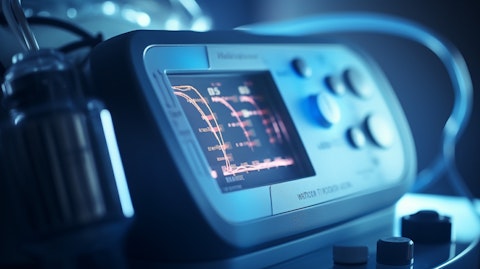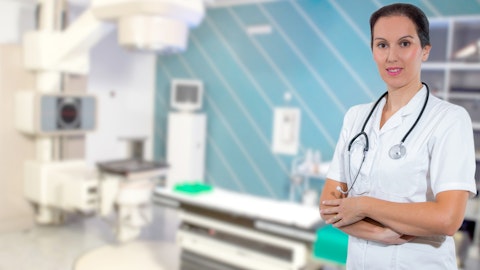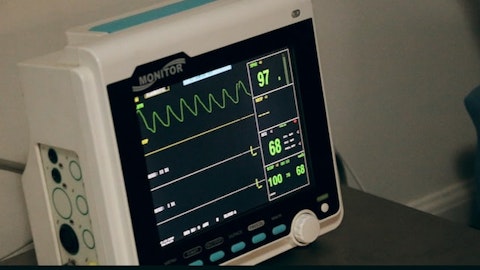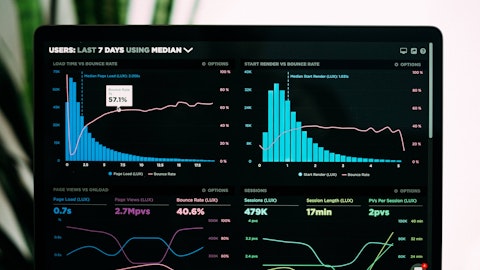Biotricity, Inc. (NASDAQ:BTCY) Q2 2024 Earnings Call Transcript November 14, 2023
Operator: Good afternoon, and welcome to Biotricity’s Second Quarter Fiscal 2024 Financial Results and Business Update Conference Call. Today’s conference is being recorded. And at this time, I would like to turn the conference over to Debra Chen with Investor Relations. Please go ahead, ma’am.
Debra Chen: Good afternoon, everyone, and welcome to Biotricity’s second quarter fiscal 2024 earnings conference call. As a reminder, Biotricity’s second quarter 2024 fiscal year ended September 30, 2023. So all figures presented for this period will reflect that end date. Earlier, Biotricity issued its fiscal 2024 second quarter press release, which highlighted financial and operational results. A copy of the press release is available on the Investor Relations section of Biotricity’s website and the full financials have been filed with the SEC on Form 10-Q, and posted on EDGAR at www.sec.gov. Before beginning the company’s formal remarks, I’d like to remind listeners that today’s discussion may contain forward-looking statements that reflect management’s current views with respect to future events.

A close-up of a medical device, exemplifying the company’s cutting-edge proprietary technology.
Any such statements are subject to risks and uncertainties that could cause actual results to differ materially from those projected in these forward-looking statements. Biotricity does not undertake to update any forward-looking statements except as required. At this point, I’m pleased to turn the call over to Biotricity’s Founder and CEO, Dr. Waqaas Al-Siddiq. Please go ahead.
Waqaas Al-Siddiq: Thank you, Debra. And thank you, everybody, for joining us today. This quarter, we continue to make substantial progress, reporting double-digit sales growth. Our recurring technology fees, device sales and gross margins all demonstrated positive growth while we maintain cost control in order to make progress on our plan to achieve positive cash flow and profitability. To address the increasing interest and demand for our suite of products, we launched our new online store this September, which provides a user-friendly integrated shopping experience to showcase all of our monitoring devices, which we believe will further enhance our distribution sales and streamline our sales operations. Additionally, our sales force has amplified our geographic reach, and we’re pleased to announce that as of September 30, 2023, we have customers in over 32 states in the U.S., contributing to an impressive 21.4% year-over-year revenue growth.
Our gross margins have also improved significantly, rising from 54% during the same period last year to an impressive 69%. We also saw a reduction in our SG&A by 22% to $3.5 million, which was something that we said we could continue to monitor and trim in the previous quarters. Through diligent cost structure management and strong growth across the board, we achieved a reduction of our net loss by 20% year-over-year from $4.9 million to $3.9 million, or $0.446 per share. As we review our second quarter financials, I think it’s important to highlight a few takeaways for why we are here and what we are trying to achieve. Since founding Biotricity, our mission has been to innovate and create transformative health care products in preventative care.
Today, we deliver pioneering remote monitoring solutions to the medical, health care and consumer markets, focusing on diagnostic and post-diagnostic solutions for lifestyle and chronic illnesses. Although it remains an unmet need, we are witnessing the paradigm shift within the health care world, from reactive to proactive and see how technology propels the emergence of solutions that contribute to improved curative therapies. We addressed the diagnostic aspect of remote patient monitoring by innovating with established business models that already have reimbursement structures in place. This method, we believe, mitigates the risks typically associated with traditional medical device development and speeds up the journey to generating revenue.
In the post-diagnostics sector, we incorporate medical-grade biometrics, empowering consumers to self-manage. This approach aims to enhance patient compliance and ultimately, lower health care costs. For a full suite of products in the Biotricity platform, please visit www.biotricity.com. Turning to our Biosphere platform and complementary products, our Biocare app has garnered tens of thousands of downloads and Biosphere continues to attract industry-wide interest among both new and existing customers. It is clear that AI has become a big component to what we are developing in our realm of remote cardiac care. We are leveraging proprietary AI technology to develop a suite of predictive monitoring tools to enhance new disease profiling, improved patient management and revolutionize the health care industry for disease prevention.
Additionally, we strengthened our partnerships with major players, including Amazon and Google. With the health care AI market anticipated to reach $208.2 billion by 2030, we’ve already positioned ourselves as a significant player. Our powerful proprietary cardiac AI model integrates Google’s TensorFlow, AWS infrastructure, Big Data and a continuous learning engine, allowing for rapid advancements in our cardiac technology. This has led to increasing sales of our remote cardiac monitoring devices and the ramp-up of our subscription-based service, increasing our recurring revenue over the past few quarters. Our ability to grow this type of revenue is predicated on the size and quality of our sales force to place these devices with clinically focused health care providers operating in the cardiac sector.
In the coming months, we will continue to use our team to address new markets and achieve sales penetration in the markets currently served. With that, I will turn the call over to our CFO, John Ayanoglou.
John Ayanoglou: Thank you, Waqaas. As Waqaas has already addressed the fiscal year second quarter numbers at a high level and the market and the industry and key operational matters, I will not delve into the unaudited highlights of the second quarter and some of the details for the second quarter of fiscal 2024. Our Technology-as-a-Service subscription-based recurring revenue from our cardiac monitoring device, Biotres and our FDA-cleared Bioflux device continue to see demand and market adoption. Biotricity as previously announced that they have monitored over 2 billion heartbeats for Afib, atrial fibrillation, a primary contributor to strokes. Over the past few years, this initiative has positively impacted well over 14,000 patients diagnosed with Afib and continues to do that, offering them the potential for earlier medical intervention.
This not only enhances patient outcomes but also underscores the substantial health care cost savings for both individuals and the broader health care system. Revenue for the second quarter ended September 30, 2023, increased by 21.4% year-over-year to a stable level of $2.9 million, just under the $3 million mark posted for the immediately preceding quarter, but on higher quality of earnings. The months of August and December have traditionally been slower months as patients and doctors go on vacation or otherwise reduce office hours over the vacation and holiday periods. However, there is more going on here. This quarter, we continued to transition our Houston-based customers to our subscription-based service, ramping up our efforts to do this.
While this shift to a higher quality of earnings may result in an initial dip in revenues, it lays the groundwork for quality in the form of increased, recurring and predictable revenue and benefits us in the long term while helping us chart a clearer path to profitability. This quarter is a testament to the improvements in our business as a direct result of those efforts. Our gross profit percentage was 69.1% for the quarter ended September 30, 2023, as compared to 53.8% in the corresponding prior year quarter and 63.5% in the immediately preceding quarter. This increase in gross margin is due to our expanding recurring technology fee revenue base and proportion of our sales mix in that component, which has consistently stayed above 70%. We also gained efficiencies in using AI and data processing and improved our monitoring cost structure.
This is in line with our expectations on improving both performance and margins as our recurring business grows. Looking ahead, we anticipate continued improvement in an overall blended gross margin over time. Technology fee revenue comprised 94.5% of the quarter’s total revenue for the 3-month period ended September 30, 2023. Gross profit totaled $2 million, up 56.2% from the $1.28 million, comparatively for the same period in the prior year. We have expanded our sales efforts across a broader geographic footprint with the intention to expand further and compete in the broader U.S. market using an in-sourcing business model. Our technology has a large potential total addressable market, which can include hospitals, clinics and physicians’ offices as well as other independent diagnostic testing facilities, known in the industry as IDTF.
I want to remind you that cardiac is the number 1 chronic care condition, not only in the U.S. but all around the world, and our connected technology is useful across the globe. But there’s more. Our sales expenses decreased or improved by 1% and our R&D decreased or improved by 2% this quarter, such that we reduced our loss from operations by $140,000 this quarter. With respect to sales expenses, we’ve been able to do this through the retooling of our sales force, focusing on hunters rather than farmers in terms of the profile of each of our salespeople, our professional salespeople, thereby leading to a variable sales compensation for our external and more senior salespeople that is more direct drive and aligned to growing our recurring profitability while we’ve taken the job of maintaining our customer accounts and improving their satisfaction levels, by using a focused internal sales team that is less expensive.
This is a good news story because we’ve been able to earn our higher-quality revenue with a smaller professional sales force that is less expensive thereby reducing our overall sales expense, while at the same time, managing cash and putting our product that will enhance our hospital and strategic footprint. Our efforts to improve the quality of our earnings and our cost structure are visible in this quarter’s results. Despite the slight dip in revenues, we’ve improved margins, reduced sales and operating costs and improved our loss from operations to under $2.2 million, reducing operating losses by over $1.8 million from the corresponding prior year quarter and $131,000 from the immediately preceding quarter. Net loss attributable to common shareholders for the three months ended September 30, 2023, was $3.9 million compared to a net loss of $4.9 million during the comparable quarter in the prior year.
When compared to the immediately preceding quarter, our net loss to common shareholders degraded by $280,000 due to increased interest costs, rising rates on variable term loan interest caused that and accretion expense. Earnings per share was $0.441 versus $0.411 compared to the preceding quarter. Adjusted EBITDA improved by about $66,000 such that adjusted EPS was an improved $0.23 per share versus $0.24 per share in the immediately preceding quarter. Underpinning all of these improvements in the quality of our earnings and our cost structure is the fact that month-to-date, November is shaping up to be an excellent month, perhaps, our best month of device sales ever. As we advance the commercialization of Bioflux, Biotres and Biocare products, we anticipate a continuing growth trajectory.
And we’ve just launched our Biotres Pro, which our sales force tells us is going to be a groundbreaking product that will have a lot of demand. The market’s growing interest and demand for our suite of products dedicated to chronic cardiac disease prevention and management reinforces our confidence in our market position and our focus on commercialization and development has resulted in significant advancements in remote monitoring solutions for both diagnostic and post-diagnostic products, bringing us closer to achieving positive cash flow. I will now turn the call back to Waqaas for his closing comments.
Waqaas Al-Siddiq: Thank you, John. In looking at the near-term and long-term prospects for Biotricity, there is a lot to be excited about. We recently announced a patent application for our groundbreaking Biotres device. This filing is part of our broader strategy of expanding our IP portfolio with trade secrets and patents. As we consistently innovate and expand our IP and FDA 510(k) portfolios, we are not only winning market share and protecting our IP, but continuously increasing the barriers to entry. We also filed a patent application for our innovative wearable heart monitoring device Bioheart, which is recognized by Time Magazine as one of the best inventions of 2022. Finally, we just expanded our current product portfolio with the release of our Biotres Pro, with critical capability of cellular backup for off-line connectivity.
This is a game-changing product to our current product, the Biotres, which is our three-channel technology for preventative and comprehensive cardiac care. Previously, we actually offered up to 30 days of recording and automated data offloading while connected wirelessly. But with the addition of Biotres Pro’s innovative cellular connectivity, there are no longer delays in data retrieval that may have occurred previously due to low connectivity. This marks a significant leap forward as our Biotres Pro offline data storage established it as the leading solution for cardiac monitoring. With the addition of Biotres Pro, Biotricity now has the most comprehensive remote cardiac monitoring portfolio in the market. That concludes our opening remarks.
I will now turn the call over to the operator for questions. Thank you.
See also 20 Most Advanced Countries in Journalism and 20 Stocks with the Lowest PE Ratio.
Q&A Session
Follow Biotricity Inc. (OTC:BTCY)
Follow Biotricity Inc. (OTC:BTCY)
Receive real-time insider trading and news alerts
Operator: [Operator Instructions] And the first question comes from the line of Kevin Dede with H.C. Wainwright. Please proceed with your question.
Michael Davin: Well, thank you, operator. This is Michael Davin, calling on behalf of Kevin Dede. Congrats, Waqaas. And for the Biotres Pro, can you discuss a little bit more about that cellular backup for connectivity feature? And how it — I see how it helps patients, but also how it help clinics? Just provide a little bit more color on that aspect.
Waqaas Al-Siddiq: Appreciate it. Yes, sure. So the cellular backup, I mean, sometimes when you end up having these patients might forget to charge your cellphone or the connectivity is interrupted because the Biotres is a Bluetooth based device. And so in that case, data may not be fully uploaded by the time the device is returned. So when the device is returned, the clinic may have to plug it in and it will charge and while it’s charging, it might upload and taking 10 minutes upload the data. So to remove that having cellular backup so that even if connectivity is interrupted, it will continue to upload in the background.
Michael Davin: Okay. Great. Appreciate that. Now what are you guys seeing? You mentioned hospitals, clinics, independent labs, where are you seeing most of demand right now? Is there one segment that is producing more demand for you guys?
Waqaas Al-Siddiq: Demand for us is pretty much across the board. I think the way to look about is more about where are we focusing our time. So previously, we were spending a lot of our — 80% to 90% of our time on the independent market, like the specialty cardiac center groups, and about 10% of our time on the hospital market. And as we build the business and as we’ve been able to drive revenue now, what we are looking at is creating a more blended mix. So 60% of our time is still focused on the independent market, but 40% of our time is now spent on the hospital markets. We understand that the sales cycles are longer with the hospital. But once you close the system, you generally have multiple orders and a long-term relationship as well as a much bigger order in the long run.
So — but we want to continue to close business on a monthly basis and on a quarterly basis, so we have this blended mix now, so as opposed to what we were doing before. Now we’ve taken a chunk of our commercial team and have focused it towards going after the hospital.
Michael Davin: Great. Understood. And in terms of focusing our time and efforts are you planning to expand beyond these 32 states? Or is your sales force kind of focus on those clinics and those hospitals, those 32 states prior to further expansion?
Waqaas Al-Siddiq: We are always looking at opportunities and always looking to expand. A lot of our customers have colleagues, friends that they went to medical school with or they’ve moved from a different stage. So we go into our existing network and existing customer network and look for referrals. And as opportunities arise in other states, we absolutely go after them. So it’s not — it’s not something that we are specifically saying, hey, we don’t want to go into other states. It’s more about, we have a footprint that is primarily driven by where we have reps and the geography where our reps are based. And then the secondary aspect of where we are is really based on opportunities that are coming in from our referral network.
So the goal is to be in 50 states, but we are not chasing a particular state. We are chasing and focusing on building the most powerful commercial team that we can. And so it’s really about finding the right types of reps and expand our commercial team and our commercial capability. And then as time goes on, I think we will see ourselves going to and have a full national footprint across all 50 states.
Michael Davin: Okay. Great. Now in terms of your aim to enhance patient compliance. Is there a way to quantify that at this stage?
Waqaas Al-Siddiq: So patient compliance, it’s tough. We are looking into that. We’ve implemented an app to look at how many patients are downloading and following the rules. We’ve seen a good impact on that. We’ve seen a lot from a percentage of perspective, a significant percent of patients download the app. We are going to be looking and analyzing that data and are looking to put out an impact report, and part of that will be looking at patient compliance.
Michael Davin: Okay. Okay. And last question. Can you expand upon your partnership with Amazon and Google in terms of what TensorFlow means to overall operations as well as with Amazon’s infrastructure? And given that Biotricity has this proven track record, do you see any potential for further opportunities between you and Amazon or Google?
Waqaas Al-Siddiq: Yes. So what we’ve done is we’ve built our proprietary analytics and data cloud using the technologies within Amazon’s automation and scaling infrastructure and Google’s AI and deep data systems. So we’ve taken those — the elements that are most powerful and applicable to our product category and our use case and build our own proprietary data cloud and ecosystem in terms of measurable improvements and how that’s been driven. I mean, I think you can see that in our financials, right? Our margins are improving, expenses are going down. A big part of this is our proprietary systems becoming more automated, becoming smarter, being able to deal with data in a more efficient way and allowing us to do more with less.
So that’s essentially what we’ve been doing, and I think that, that is going to come through and it’s going to continue to come through over the next couple of quarters that we will see margins improvement, data costs coming down, our cost of servicing and maintaining data, there’s economies of scale that will come through as we get more and more data. We have quite a bit. But as we get more devices out there as we collect more information, we’re going to get economies of scale. And we were very mindful of the fact that these costs and looking at these systems, the expenses can actually rise quite quickly if you’re not proactively thinking about it and looking at how to automate and develop something that is not only efficient, but also predictive, right?
So our next move is to really go into prediction because that, again, can save time and make us even more efficient.
Michael Davin: Great. Thank you, Waqaas. One final question. For Biotricity’s online store, could you kind of give some reasoning for launching this? And does this help Biotricity with reimbursements versus your devices on Amazon? What are the pros of having your store versus of the other online avenues for acquiring Biotricity devices?


